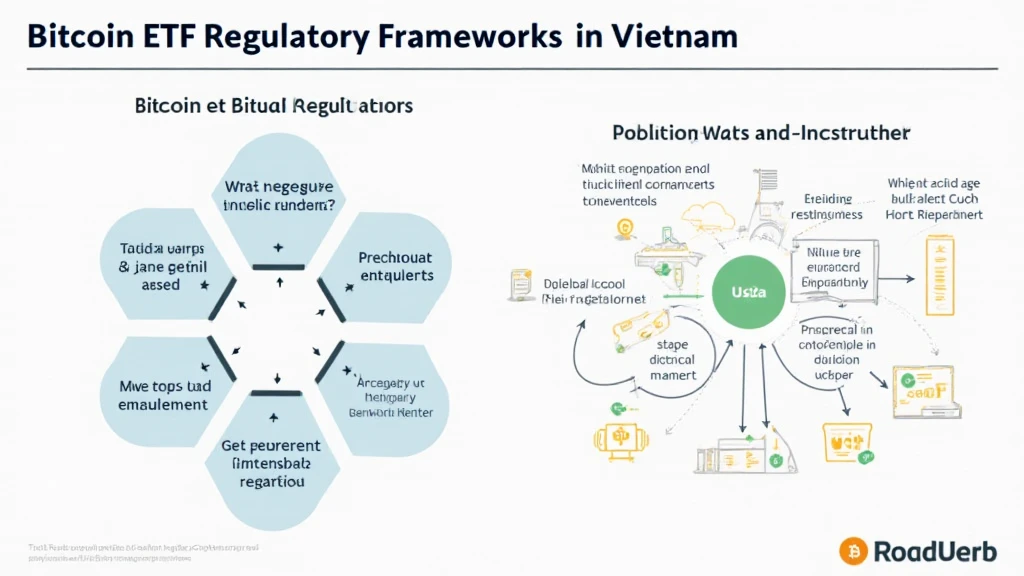Introduction
As the cryptocurrency market continues to expand, an increasing number of investors are seeking ways to gain exposure to Bitcoin without direct ownership of the asset. One such investment vehicle gaining attention is the Bitcoin Exchange-Traded Fund (ETF). These financial products provide a regulated and accessible way for both institutional and retail investors to access Bitcoin, but the regulatory landscape surrounding Bitcoin ETFs is complex and varies significantly across different jurisdictions. In Vietnam, where cryptocurrency adoption is surging, understanding the Bitcoin ETF regulatory framework is essential for investors looking to tap into the opportunities presented by this digital asset.
According to recent studies, Vietnam has witnessed a remarkable 700% growth in crypto users from 2019 to 2023. This growing interest underscores the importance of establishing a clear regulatory framework that nurtures innovation while protecting investors. However, navigating the regulatory environment can be daunting, especially in a rapidly evolving sector fueled by the potential of blockchain technology and decentralized finance (DeFi).
This article aims to provide a comprehensive overview of the current state of Bitcoin ETF regulations in Vietnam, the potential implications for market participants, and insights into what the future may hold for this emerging investment opportunity.

Understanding Bitcoin ETFs
What is a Bitcoin ETF?
A Bitcoin ETF is essentially an investment fund traded on stock exchanges, similar to other exchange-traded funds, that aims to track the price of Bitcoin. It allows investors to buy shares in the ETF without having to directly purchase or store the underlying asset. For many, a Bitcoin ETF provides a level of regulatory oversight that can alleviate concerns regarding custody and security—issues that have plagued the crypto market.
Let’s break it down: imagine a Bitcoin ETF as a digital vault that holds Bitcoin on behalf of investors, allowing them to invest in Bitcoin while mitigating risks associated with direct ownership, such as the loss or theft of private keys.
Benefits of Bitcoin ETFs
- Accessibility: ETFs can be easily traded on traditional stock exchanges, allowing individual investors to enter the cryptocurrency market with ease.
- Regulation: Regulators oversee ETFs, providing a level of confidence for investors wary of market volatility and security risks.
- Diversification: Many Bitcoin ETFs may offer exposure to multiple cryptocurrencies or blockchain-related equities, providing investors with diversified portfolios.
The Current Regulatory Landscape in Vietnam
Overview of Cryptocurrency Regulations
Vietnam has taken a cautious approach towards cryptocurrency regulation. In 2018, the government announced a ban on cryptocurrency payments while allowing the trading of cryptocurrencies. Furthermore, the State Bank of Vietnam has prohibited financial institutions from providing services related to cryptocurrencies. As such, solid regulatory provisions regarding cryptocurrencies and related financial products, like Bitcoin ETFs, are still in their infancy.
According to the Vietnam Blockchain Association, there is ongoing dialogue among the government, regulators, and industry stakeholders to establish clearer guidelines that adapt to the evolving nature of blockchain technology and digital assets. This has laid the groundwork for potential Bitcoin ETF development in the near future.
Recent Developments
The latest discussions around Bitcoin ETF regulation in Vietnam point towards a willingness by regulatory bodies to explore possibilities for institutional-grade products. A proposal has been made to allow localized Bitcoin ETF offerings, potentially tailored for Vietnamese investors with specific compliance measures. This is a positive development, especially as countries across the globe, including the United States and Canada, have successfully launched Bitcoin ETFs.
Let’s look at how some of these developments can pave the way for a robust Bitcoin ETF framework in Vietnam:
- Research and Consultation: Vietnamese regulators are exploring collaborations with domestic and international experts to shape appropriate policies.
- Investor Education: Initiatives aimed at educating the public about Bitcoin, ETFs, and overall investment principles are flourishing.
- Regulatory Clarity: Continued emphasis on creating a regulatory environment that promotes innovation while safeguarding investors is evident.
Implications for Investors in Vietnam
Market Readiness for Bitcoin ETFs
With a growing pool of cryptocurrency investors in Vietnam, the introduction of a Bitcoin ETF would resonate strongly within the local market. A survey by Statista indicates that around 16% of Vietnamese respondents are considering investing in cryptocurrencies in the coming year. This reveals a significant opportunity for Bitcoin ETFs to capture investor interest and broaden their reach.
However, several factors need to be carefully considered before the launch of any ETF products:
- Regulatory Compliance: ETFs must adhere to stringent regulatory requirements to operate effectively in the Vietnamese market.
- Market Infrastructure: Adequate trading infrastructure must be established to facilitate seamless transactions for retail and institutional investors.
- Public Perception: Ensuring that potential investors have a solid understanding of how ETFs function is crucial for adoption.
Potential Risks
As enticing as Bitcoin ETFs may appear, potential investors must also be aware of the inherent risks associated with this investment vehicle:
- Market Volatility: The cryptocurrency market is notoriously volatile; a Bitcoin ETF would not be immune to price fluctuations.
- Regulatory Uncertainty: Ongoing regulatory developments can impact the viability and framework of Bitcoin ETFs.
- Security Risks: Despite regulatory oversight, security vulnerabilities associated with digital assets can pose significant risks.
A Glimpse Into the Future
The Path Forward
The evolution of Bitcoin ETF regulations in Vietnam is a critical component of the broader goals regarding digital asset frameworks. As the market develops, potential timelines for launching Bitcoin ETFs may depend on several factors, including:
- Policy Development: Ongoing discussions among policymakers and industry stakeholders will shape the final regulatory guidelines.
- Investor Demand: Growing interest from investors can create further urgency for regulators to act decisively.
- International Trends: Watching the global trend towards Bitcoin ETFs will provide valuable insights that can inform Vietnam’s approach.
The Significance for Retail and Institutional Investors
The roll-out of Bitcoin ETFs would serve as a pivotal point for both retail and institutional investors. Retail investors will be afforded greater access to cryptocurrency investment through regulated channels, while institutional investors can benefit from enhanced legitimacy and security surrounding their investments. Additionally, a successful launch of Bitcoin ETFs could bolster Vietnam’s position on the global crypto stage.
Moreover, the establishment of a regulated environment will likely contribute positively to investor confidence, fostering long-term growth in the digital asset ecosystem in Vietnam.
Conclusion
In conclusion, the future of Bitcoin ETF regulation in Vietnam holds immense potential for investors looking to engage in the cryptocurrency market. As the regulatory landscape continues to evolve, ensuring a clear framework will be vital, balancing innovation while prioritizing investor protection.
While the road may be fraught with challenges, the opportunities presented by Bitcoin ETFs are ripe for exploration, making it essential for both state actors and market participants to work collaboratively towards establishing a conducive regulatory environment.
The rise of Bitcoin ETFs could unlock exciting avenues for investment, establishing Vietnam not just as a participant, but as a prominent player in the growing global cryptocurrency ecosystem.
Disclaimer: This article is for informational purposes only and should not be construed as financial advice. Investors should consult local regulators and analyze their investment choices carefully.
This article was prepared by Dr. Nguyen Tuan Anh, a recognized authority in cryptocurrency regulation and blockchain technology, with over 20 published papers in the field and leadership in several high-profile auditing projects.





